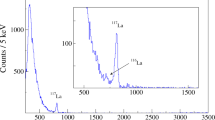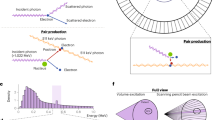Abstract
WITH the improved apparatus, already used by us in the investigation of positrons from thorium-active deposit, we have repeated our measurements of the positron spectrum, emitted by a thin-walled radon tube; a new determination of the ratio of the positron number to that of the particles of RaC was also made. The positron spectrum is shown in Fig. 1: for each point about 1,000 particles were counted. The ratio N+/N was found to be 2–3 × 104 (N+ = number of positrons, N = number of particles of RaC). Surrounding the source with a 1 mm. lead sheet, we could compare the number of positrons emitted by the source with that produced by the rays of RaC in lead: it was found that N+/N+ (Pb) = 0.91.
This is a preview of subscription content, access via your institution
Access options
Subscribe to this journal
Receive 51 print issues and online access
$199.00 per year
only $3.90 per issue
Buy this article
- Purchase on Springer Link
- Instant access to full article PDF
Prices may be subject to local taxes which are calculated during checkout
Similar content being viewed by others
References
A. I. Alichanow, A. I. Alichanian and M. S. Kosodaew, NATURE, 136, 475, Sept. 21, 1935.
D. Skobelzyn and E. Stepanowa, J. Phys., 6, 1; 1935.
Author information
Authors and Affiliations
Rights and permissions
About this article
Cite this article
ALICHANOW, A., ALCHANIAN, A. & KOSODAEW, M. Emission of Positrons from Radioactive Sources. Nature 136, 719–720 (1935). https://doi.org/10.1038/136719b0
Issue Date:
DOI: https://doi.org/10.1038/136719b0
This article is cited by
-
Sulla conversione interna della energia cinetica degli elettroni delle sostanze β− attive
Il Nuovo Cimento (1950)
-
Sulla conversione interna della energia cinetica degli elettroni delle sostanze β- attive
Il Nuovo Cimento (1950)
-
Production of Positrons by β-Rays
Nature (1936)
Comments
By submitting a comment you agree to abide by our Terms and Community Guidelines. If you find something abusive or that does not comply with our terms or guidelines please flag it as inappropriate.



